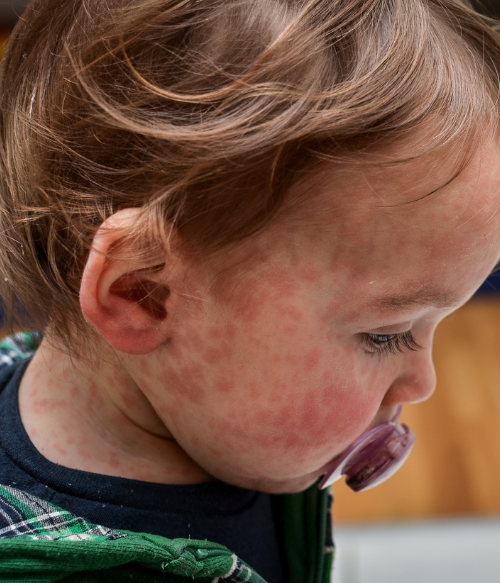Measles
Measles is a highly contagious viral illness that spreads through the air when an infected person coughs or sneezes. The virus can linger for up to two hours after the person leaves the area.
Measles is not just a rash. It can cause serious illness, especially in babies and young children.
Symptoms
- High fever (often >104°F)
- Cough
- Runny nose
- Red, watery eyes
- Rash beginning 3–5 days after symptoms start, spreading from face to body
Symptoms of measles usually begin 7 to 14 days after exposure, but can appear up to 21 days after exposure.
Vaccination
Protect yourself and your family by being up-to-date with the measles, mumps, rubella (MMR) vaccine.
- Two doses of the MMR vaccine are about 97% effective at preventing measles.
- The vaccine is safe and provides lifelong protection for most people.
- Check your vaccination record. Tips to locate your vaccine record.
- Check Your Immunity (Quiz Tool): You are protected if you were born before 1957, are vaccinated or have lab proof of immunity.
The Health Department offers the MMR vaccine on a walk-in basis Monday - Friday, 8 - 11:30 a.m. and 1 - 4 p.m. Doses are available for uninsured or underinsured individuals who have never been vaccinated. For more information, call the Immunization Clinic at (828) 694-6015.
If You Have Symptoms of Measles
If you develop symptoms:
- Stay home and limit contact with others.
- Call your health care provider or local health department right away.
- Call ahead before visiting a doctor’s office, urgent care, or emergency room so steps can be taken to prevent exposure to others.
Laboratory testing is not recommended unless symptoms develop, in line with state guidance.
If You Think You Were Exposed to Measles
If you believe you may have been exposed to measles:
- Locate your vaccination records or other evidence of immunity. People who have received the MMR vaccine or have other evidence of immunity are unlikely to get measles.
- If you are not immune:
- Contact your health care provider. Call first to schedule an appointment and tell them about the exposure so they can take steps to protect you and others.
- Your provider may recommend:
- The MMR vaccine, or
- A medicine called immune globulin to help reduce risk.
- Stay home for 21 days after exposure.
- You may hear from public health officials as part of routine follow-up.

